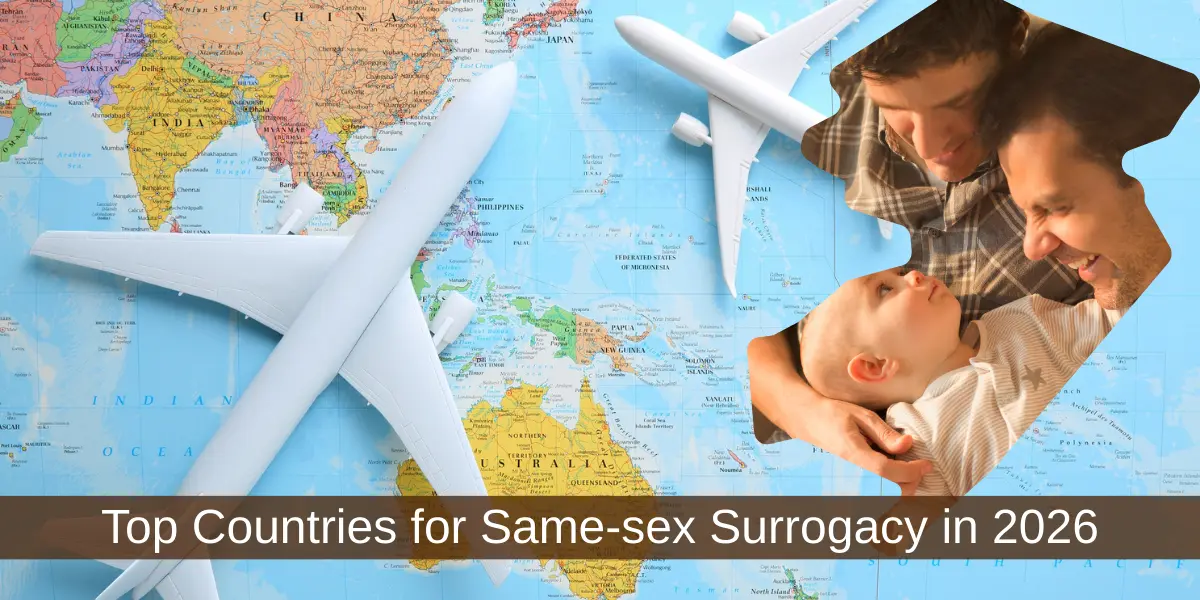If you and your partner are exploring surrogacy as gay parents, the legal, medical and practical landscape can feel like a maze. Laws change frequently, and what’s allowed for same-sex couples in one place may be restricted in another. Below I’ve gathered an up-to-date, practical comparison of the countries that currently offer accessible pathways for same-sex surrogacy (or where it is commonly used by gay couples). For each destination I cover: laws and eligibility, typical costs, success rates or clinical quality, and the main pros & cons — plus a short conclusion to help you choose.
Quick note: surrogacy rules are often state/region-specific (for example in the U.S., Australia and Mexico). Always confirm local rules with a lawyer or clinic before making plans.
-
United States
Laws / eligibility:
There is no single federal surrogacy law in the U.S.; rules vary by state. Many states (including California, Illinois, Connecticut and others) are highly surrogacy-friendly and routinely grant pre-birth parentage orders for same-sex couples, while a minority restrict or disallow certain arrangements. It’s essential to pick a surrogacy-friendly state and work with a local ART attorney.
Costs:
Commercial surrogacy in U.S. clinics is among the most expensive globally — typically USD $120,000–$200,000+ depending on agency, surrogate compensation, legal fees, and IVF cycles.
Success rates / medical quality:
Top U.S. clinics report high IVF and gestational surrogacy success rates (clinic‐dependent), with world-class labs and paediatric care.
Pros:
- Strong legal protections in friendly states
- Established industry, wide availability of donor sperm/eggs
- Excellent neonatal and fertility care
Cons:
- Costly;
- Need to travel to/choose the right state;
- Legal complexity if intended parents live elsewhere.
-
Canada — safe, regulated, LGBT-friendly
Laws / eligibility:
Surrogacy is legal in Canada under altruistic rules — commercial payment is prohibited, but surrogates may be reimbursed for reasonable expenses. Same-sex couples are eligible; parental orders and recognition procedures are well established. Because rules can involve provincial steps, you’ll work with local counsel and clinics.
Costs:
Lower than commercial destinations — major expenses are medical, legal, travel, and travel-related reimbursements. Expect USD $40,000–$90,000 depending on services and travel.
Success rates / medical quality:
High clinical standards and accredited IVF centers — success rates comparable to other developed countries.
Pros:
- Strong legal recognition of intended parents
- High medical standards
- Welcoming to same-sex couples
Cons:
- No paid surrogacy market — finding a willing altruistic surrogate (especially for non-residents) can be harder
- Parentage procedures differ by province
-
 Colombia — accessible, affordable and progressive
Colombia — accessible, affordable and progressive
Laws / eligibility:
Colombia’s courts and legal environment have been interpreted to allow surrogacy for same-sex couples and single intended parents; the country is increasingly used by international intended parents. Domestic law and court practice generally respect non-discrimination on sexual orientation. Still, legal processes (parentage and registration) should be handled by experienced local lawyers.
Costs:
One of the more affordable full-service options: USD $35,000–$60,000 (clinic + surrogate compensation + legal fees), though prices vary with clinic and extras.
Success rates / medical quality:
Good modern clinics and IVF success rates; strong availability of donor gametes.
Pros:
- Lower costs
- Progressive legal environment
- Growing ecosystem for international intended parents
Cons:
- International paperwork and citizenship processes need careful handling
- Local legal practice is evolving (less settled than some western countries)
-
Mexico — state-by-state options (some states friendly)
Laws / eligibility:
Mexico does not have a single nationwide policy; some states (e.g., certain states in recent years) have permitted surrogacy for same-sex couples and foreigners, while other states restrict it. The landscape changes, so intended parents should confirm the law in the specific state and consult local counsel. (When considering Mexico, pick a clinic and state with a clear legal framework.)
Costs:
Typically lower than the U.S.; many international packages fall in USD $35,000–$60,000.
Pros:
- Cost-effective
- Geographically convenient for North American intended parents
Cons:
- Legal patchwork — potential exportability issues for the child’s nationality or home-country parentage recognition
- Some states may restrict same-sex access or foreign intended parents — high due diligence required
-
Argentina — accessible but legally unsettled
Laws / eligibility:
Argentina has been used for surrogacy by same-sex couples and foreigners, but the legal situation has been inconsistent: courts often fill gaps where national law is silent, and recent prosecutions and investigations have highlighted risks. Intended parents should exercise caution and get expert local legal advice.
Costs:
Often mid-range (USD $30,000–$60,000), but legal uncertainty increases risk.
Pros:
- Lower costs
- Some supportive clinics
Cons:
- Legal unpredictability; recent enforcement actions make this higher risk
- Cross-border recognition may be complex
-
South Africa — clear domestic pathway for residents
Laws / eligibility:
South Africa permits surrogacy under its Children’s Act framework. Surrogacy is possible for same-sex couples, but requirements (such as domicile of surrogate and intended parents) apply — many provisions are oriented toward domestic arrangements, so international intended parents should research carefully.
Costs:
Vary widely; generally lower than U.S./Europe but higher than some Latin-American options.
Pros:
- Respectable medical care and a legal framework that recognises surrogacy
- Relatively progressive
Cons:
- Residency/domicile rules and procedural steps can complicate cross-border cases
- Less familiar to international intended parents compared to e.g., Canada or the U.S.
-
Kenya — an emerging option (with caution)
Laws / eligibility:
In Kenya the situation is somewhat unique: there is no specific national law regulating surrogacy, which means arrangements operate in a legal grey area.
Some clinic-/agency-web-pages state that surrogacy “is allowed for same-sex couples” though these statements are not backed by formal legislation.
At the same time, it is important to note that same-sex marriage or unions are not legally recognised in Kenya, and same-sex sexual relations are criminalised under Kenyan law.
Thus, while some agencies may welcome gay couples, the legal ground around parentage, recognition and export of the child may be uncertain.
Costs:
Surrogacy in Kenya is reported as significantly less expensive than many western countries. For example, one source estimates gestational surrogacy around USD $35,000 (all inclusive) while traditional surrogacy around USD $30,000.
Another source suggests costs between USD $33,000–$52,000 depending on clinic and service level.
Success rates / medical quality:
Kenya has growing IVF and fertility services, especially in Nairobi and certain clinics, but oversight and standardisation may not be as robust as highly regulated countries.
Pros:
- Relatively low cost compared to North America/Europe
- Some agencies claim to work with intended parents internationally, including same-sex couples
- Attractive for budget-conscious gay couples
Cons:
- Legal uncertainty for same-sex couples: parentage, recognition, citizenship, export of child may be fraught
- No formal regulation—reliance on contract rather than statute
- Social and cultural context: Kenya remains socially conservative and LGBTQ+ rights are limited; this may create additional risks or sensitivities for gay couples
- Because legal recognition is unclear, intended parents may face complications when bringing the child home, especially in jurisdictions that require legal parentage/recognition prior to entry.
My verdict on Kenya:
Kenya can appear as an appealing lower-cost option for gay surrogacy, but because of the legal ambiguity and the lack of formal recognition frameworks for same-sex parentage, it carries more risk than jurisdictions with established law and precedent. If you consider Kenya, it’s critical to engage expert local legal counsel, work with a trustworthy agency, and ensure you have a clear plan for how recognition and travel/immigration of the child will work in your home country. For many gay couples the “cost savings” may be offset by added legal/recognition risk down the line.
-
Netherlands, Spain, UK, Australia — nuanced or restricted approaches (altruistic/regulated)
These countries have complex, sometimes shifting rules:
- Netherlands: Moving toward regulated surrogacy frameworks that open pathways for same-sex couples under altruistic rules; commercial surrogacy is banned.
- United Kingdom: Altruistic surrogacy is legal and same-sex couples can seek parental orders; international surrogacy and parental recognition require careful legal steps.
- Spain: Surrogacy contracts are generally considered null under Spanish law, so Spanish couples often go abroad for surrogacy and then seek recognition — this creates extra legal steps.
- Australia: Surrogacy law is state-based. Some states allow same-sex couples and altruistic surrogacy; rules vary and reforms continue.
Pros:
- High medical standards and legal protections domestically (where allowed)
- More alignment of LGBTQ+ family recognition in many cases
Cons:
- Most of these jurisdictions restrict commercial surrogacy, and international intended parents face complex recognition and citizenship/immigration procedures
- Costs may still be high (even if lower than U.S. commercial) and waiting lists may be long
- Cross-border issues: bringing a child home may require extra legal steps, especially for same-sex couples
How to choose the right country (practical checklist)
- Legal certainty first.Confirm whether same-sex couples are explicitly allowed and whether parentage will be recognised at home.
- Residency & citizenship rules.Will the child get a travel document quickly? Will you be recognised as the parents in your country?
- Clinic quality and success rates.Review clinic success data, accreditation, and counselling services.
- Cost vs risk.Lower cost destinations can be attractive, but legal or enforcement risk can be costly down the line.
- Ethical standards.Check for transparent contracts, fair surrogate compensation / reimbursement, and protections for surrogates.
- Local legal help.Hire an ART attorney experienced with international surrogacy for the destination you choose.
Conclusion
There’s no one-size-fits-all “best” country for surrogacy for gay couples. If your priority is legal certainty and parental recognition, the U.S. (in friendly states) and Canada are strong choices. If cost is the main factor and you accept additional legal complexity, Colombia and parts of Mexico are popular options. Kenya and selected other jurisdictions offer alternatives where cost is lower — but carry more legal and process risk. South Africa and selected European countries offer other alternatives where domestic rules permit same-sex surrogacy, but always confirm up-to-date laws and procedures.


No Comments